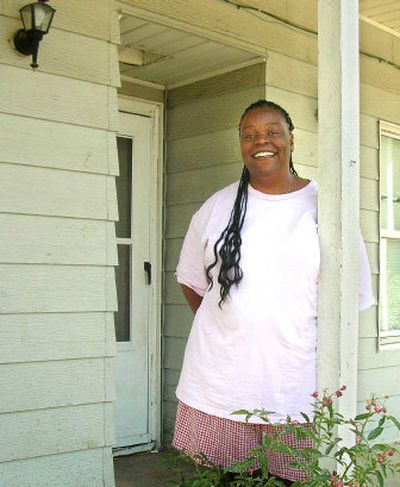‘Thirty cents?’ Sometimes, it’s just nonsense

It was a hot August day when I read Katreena Ann Rogers’ e-mail.
She forwarded me a copy of a letter she’d written to Spokane Mayor Dennis Hession.
“I am writing to you today because I am a frustrated single mother,” she wrote. “I am raising three beautiful children on my own with no support.”
She described her recent appointment at the Washington Department of Social and Health Services, where she learned her July paycheck put her 30 cents over a cutoff for a one-time welfare grant.
Thirty cents.
She had rent due, along with water and electric bills and a Rent-A-Center payment for her couch, two chairs and a washer and dryer. And soon it would be time to shop for school supplies for her 13-year-old son and 6- and 8-year-old daughters.
“… I do not make anywhere near $20,000 a year,” she wrote.
I thought about the heat, the high gas prices and this baffled single mom. I knew the mayor didn’t run DSHS, but I wanted to find out more about that extra 30 cents, and how in the world Katreena Ann Rogers manages to raise three kids on her salary.
So I drove to her gray clapboard home on Bridgeport, sat down on her couch and asked her.
“I’ll be honest with you,” Katreena said, her brown eyes suddenly soft and shining. “With God’s grace and mercy, and that’s the truth. Because he can take what little I do have and stretch it.”
Katreena is 34, a 1991 graduate of Lewis and Clark High School who has lived in Spokane most of her life. She moved to Tacoma at 23, where she was married, and she spent four and half years in North Carolina before moving back here. She attended Spokane Community College and usually works in customer service jobs.
After she learned about the extra 30 cents, and realized she’d never be able to get all her summer bills paid before her next monthly paycheck arrived, she made a decision.
She quit a job with a company she particularly liked and took another.
“Thirty cents,” she sighed, shaking her head. “I’m struggling to understand how 30 cents can just affect everything. That 30 cents has shifted my life.”
She planned to start her new job, a telephone sales position, last Friday. It would pay $8 an hour plus commission. The best part: Her paychecks would arrive every two weeks.
I checked with the DSHS office, where the Spokane North Community Service office administrator Mike Midkiff checked into Katreena’s file. She was right: She made 30 cents too much in July. But Midkiff said the situation was more complicated than that. Her previous employer had predicted she’d be $264 over the limit for August.
I talked with Katreena’s pastor, the Rev. Happy Watkins, at New Hope Baptist Church. He described Katreena as a hard worker who keeps trying to move up the career ladder and searching for hope.
Katreena’s one of many struggling single parents in Spokane, he said.
“I know that every Sunday I ask our congregation of 60 to 70 to give a little more,” he said. “And by God they do, and then as soon as we get it into a benevolence fund, there’s someone knocking at the door.”
He estimates his church gets four or five calls for help every day. And he knows churches, synagogues and mosques across the city have similar experiences.
“Spokane has been a generous city,” Watkins says, “Except that now things are taking a toll. The gas is just taking its toll. The prices are accelerating.”
Katreena says the state provides her children’s medical insurance and food stamps. She also receives a rent subsidy. But life for an American family of four on $15,000 a year is still tight, no matter how she doles the dollar bills out of her cookie jar.
Katreena dreams of a day when she no longer has to call her creditors to arrange for partial payments and changes in her billing cycle.
“I want to be at a point in my life when I can get a bill, look at that bill and say, ‘They want $50, I want to give them $50,’ ” she says. “I don’t want to give them $25; I want to give them the full $50.”
The next day I talked to the mayor. Dennis Hession expressed his sympathy for Katreena. He said she’s “doing all the right things” and that her life likely reflects the reality of many Spokane citizens who struggle with poverty even with full-time jobs.
He said he works to increase the economic vitality of the city so that successful businesses can share some of their profits with employees like Katreena. He pointed out that the city avoids regressive utility rate increases that hurt the poor and gives funds to many good social services organizations in the city.
For Katreena, specifically, he added that Spokane Neighborhood Action Programs helps with utility bills and Camp Fire and the Salvation Army provides school supplies. He also mentioned worker retraining programs at the community college. And he said he will raise Katreena’s questions with legislators who have more influence on DSHS regulations than he does.
In the meantime, the hot August days continue in Spokane, the gas prices keep rising and kids keep posting those long school supplies lists on their moms’ refrigerator doors.
I think of forwarding Katreena’s letter about that extra 30 cents to national lawmakers. But Katreena’s moving on. She prefers to pay her own bills anyway. She has her eye on ShopKo’s school supplies sale. Her kids need backpacks, paper, pens, pencils and crayons. The basics. She’s hoping to swing the whole works for $60.